The Junghans Max Bill Edition 60 Set of Watches
A set of three watches celebrating “60 years of Max Bill on the wrist” for collectors.
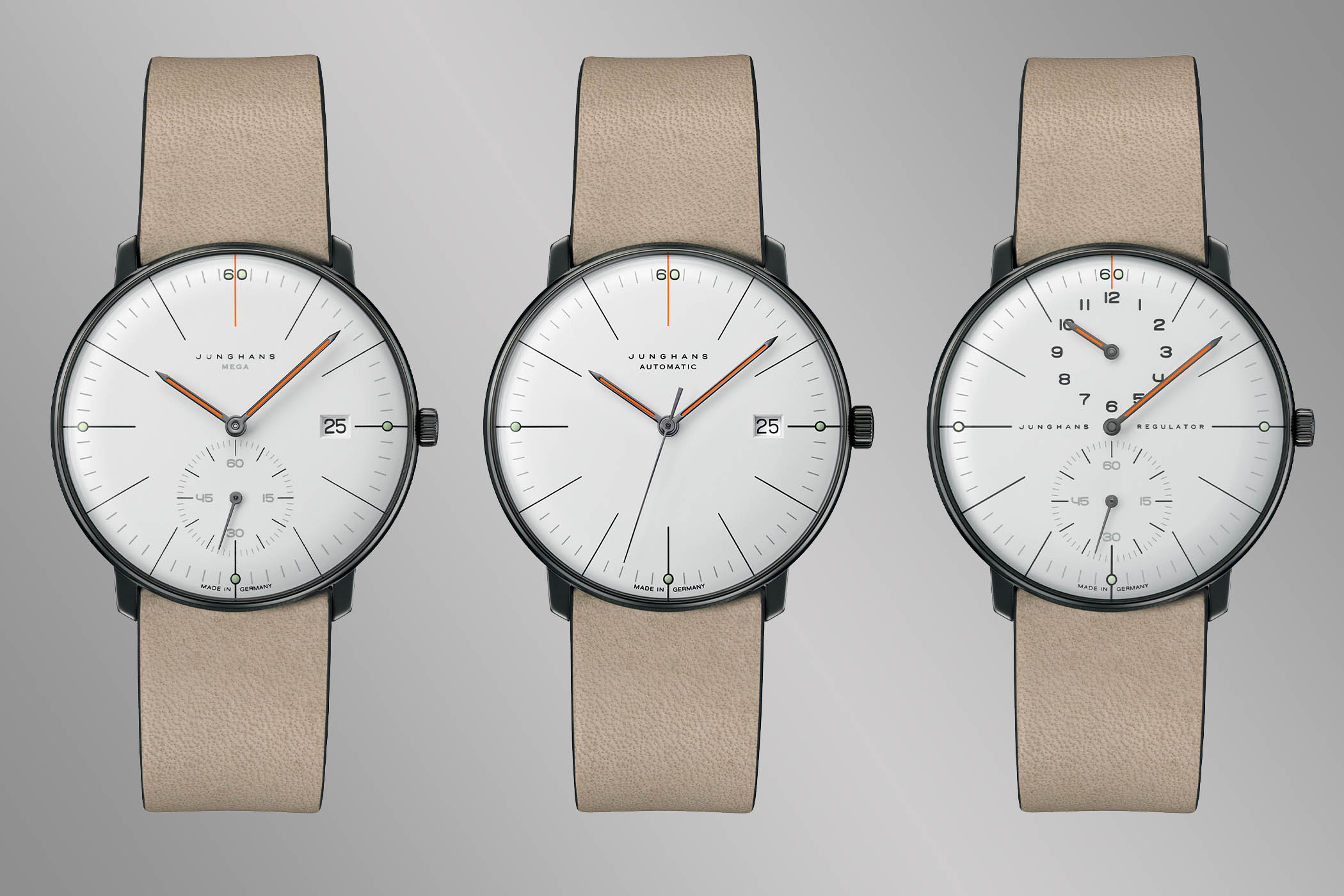
Junghans, the German watch company, celebrates the 60th anniversary of Bauhaus artist Max Bill’s first line of mechanical watches for the brand in 1961. Instead of commemorating the date with one watch, Junghans is releasing a collector’s set of three watches limited to 1,060 units worldwide. The Junghans Max Bill Edition 60 is comprised of an automatic, a regulator and a small seconds.
Brief background
Junghans, the famous German watch company, was founded in 1861 by Erhard Junghans in Schramberg (Black Forest). By 1903 had become the largest manufacturer of clocks in the world, producing over three million timepieces a year. Max Bill (1908-1994), a Swiss architect, sculptor, painter, and product and graphic designer, was commissioned by Junghans to design a kitchen clock, the Exacta of 1957. As a former student at the Bauhaus in Dessau from 1927-1928, Max Bill’s Exacta clock – leading to a 1958 table clock and eventually wristwatches in 1961 – was an expression of purist aesthetics and functionality, “as far removed from any fashion as possible”. Sixty years down the line, Jungahns’, or rather Max Bill’s designs for Junghans, have withstood the test of time and look as fresh and appealing today as they did in the 1960s.
Common traits
The watches come in an individual case inside a special edition box with a portrait of Max Bill. The colour scheme is uniform with matte white dials and subtle orange and green accents, 38mm anthracite PVD-coated stainless steel cases, a beige calf leather strap with a bright orange lining and a special engraving on the caseback.
The max bill Edition 60 Automatic
The quintessence of the Bauhaus mandate of ‘form follows function’, you’d be hard-pressed to find any superfluous element on this automatic three-hand-and-date model. The polished steel case with its anthracite PVD coating measures a discreet 38mm with a slim height of 10mm, a perfect watch for both sexes.
With its slim, barely-there bezel and short lugs, the expansive view of the dial reveals its essential, pure nature. But as any designer knows, creating a simple dial is fraught with complications. It involves a delicate balance between simplicity, design and legibility without committing the common pitfall of producing something plain.
You can really see the designer’s hand at work here with the slim, black elongated hour markers that draw the eye in towards the centre, the slightly shorter hour marker at noon picked out in orange, and the discreet but effective dots of green lume on the markers at 3, 6 and 9 o’clock. I love the way the number 60 (representing the 60 years of Max Bill on the wrist) at 12 o’clock is intersected by the orange marker and filled with green lume, a subtle touch that somehow makes a big difference (the green and orange lume are, according to the press release, ‘environmentally friendly’).
Printed on the slightly concave matte white dial, the light grey minute/seconds markers are much shorter than the indices. The anthracite pencil-style hour and minute hands have sharp tips, and their spines are filled with orange lume, while the central seconds hand tapers to a blunt tip that aligns itself perfectly with the seconds track. Completing the scenery is a bevelled rectangular window for the date at 3 o’clock.
Quick facts: 38mm x 10mm – anthracite PVD-coated steel –30m water-resistance – matte white dial with green lume dots – central hour and minute hands with orange lume, anthracite central seconds hand – date window at 3 o’clock – convex sapphire crystal with anti-reflection coating on both sides over dial – automatic J800.1 (base ETA 2824-2) – 38h power reserve – sealed caseback with Edition logo – ref. 27/4108.02
The max bill Edition 60 Kleine Sekunde
The small seconds watch in the trilogy shares practically the same design cues as the automatic but integrates a small seconds sub-dial at 6 o’clock. Again, the small seconds counter follows the design tenets of the dial and features black elongated hour markers interspersed with shorter grey minute markers and period-specific typography for the 15, 30, 45 and 60 Arabic numerals. Like the automatic, it shares the 38mm diameter and PVD-coated steel case but has a slightly slimmer height of 9mm.
Where things start to get different is below deck. Instead of the ETA automatic movement, Junghans has equipped this watch with its state-of-the-art J101.66 quartz radio-controlled movement made in Schramberg. Connected to the world’s most accurate clocks, this radio-controlled movement displays the time with insuperable precision, and the hands are positioned via ITC (Intelligent Time Correction). Introduced by Junghans in 1990 with its MEGA 1 model, this technology allows a half-second progression of the small seconds hand and the changeover of the date occurs just before the first second of the next day.
Quick facts: 38mm x 9mm – anthracite PVD-coated steel – 30m water-resistant – matte white dial with green lume dots – central hour and minute hands with orange lume – date window at 3 o’clock – small seconds at 6 o’clock – convex sapphire crystal with anti-reflection coating on both sides, mineral crystal caseback – multi-frequency J101.66 radio-controlled quartz movement – exact time display in half-second progression via SHM (Smart Hand Motion) – smart time setting via the Junghans MEGA app – date display with perpetual calendar – ref. 58/4100.02
The max bill Edition 60 Regulator
The most complex watch in the trilogy is the Max Bill Regulator, a historical layout that shines a spotlight on the minutes relegating the hours and small seconds to secondary positions. Although regulator watches have been enjoying a revival, they still elicit surprise and curiosity. Sticking to Max Bill’s Bauhaus philosophy, the dial is perfectly symmetrical – with no date window beheading the 3 o’clock marker – and extremely legible. The colour scheme and design codes are the same for all three models. Again, a slightly convex white matte dial hosts the central minutes display represented by black elongated minute markers with green luminous dots at 15, 30 and 45 minutes and the number 60 divided by an orange line and also filled with green lume. The lonely central minutes hand with its sharp pencil-style tip is filled with orange lume. Just below the number 60 are the hours, also indicated with an orange luminescent hand and directly below, almost forming a figure eight, are the small seconds with light grey numerals and a more discreet hand.
Quick facts: 38mm x 10.5mm – anthracite PVD-coated steel – 30m water-resistance – matte white dial with central minutes display – off-centred hours and small seconds at 12 and 6 o’clock, respectively – convex sapphire crystal with anti-reflection coating on both sides, sealed caseback with Edition logo – automatic J800.5 (base ETA 2824-2) – 42h power reserve – ref. 27/3190.02
Availability & Price
The Junghans Max Bill Edition 60 set is limited to 1,060 units and retails for EUR 4,060. Although Junghans will only sell the complete set to authorised retailers, POS can decide whether or not to sell the models individually.
For more information, please visit Junghans’s website.




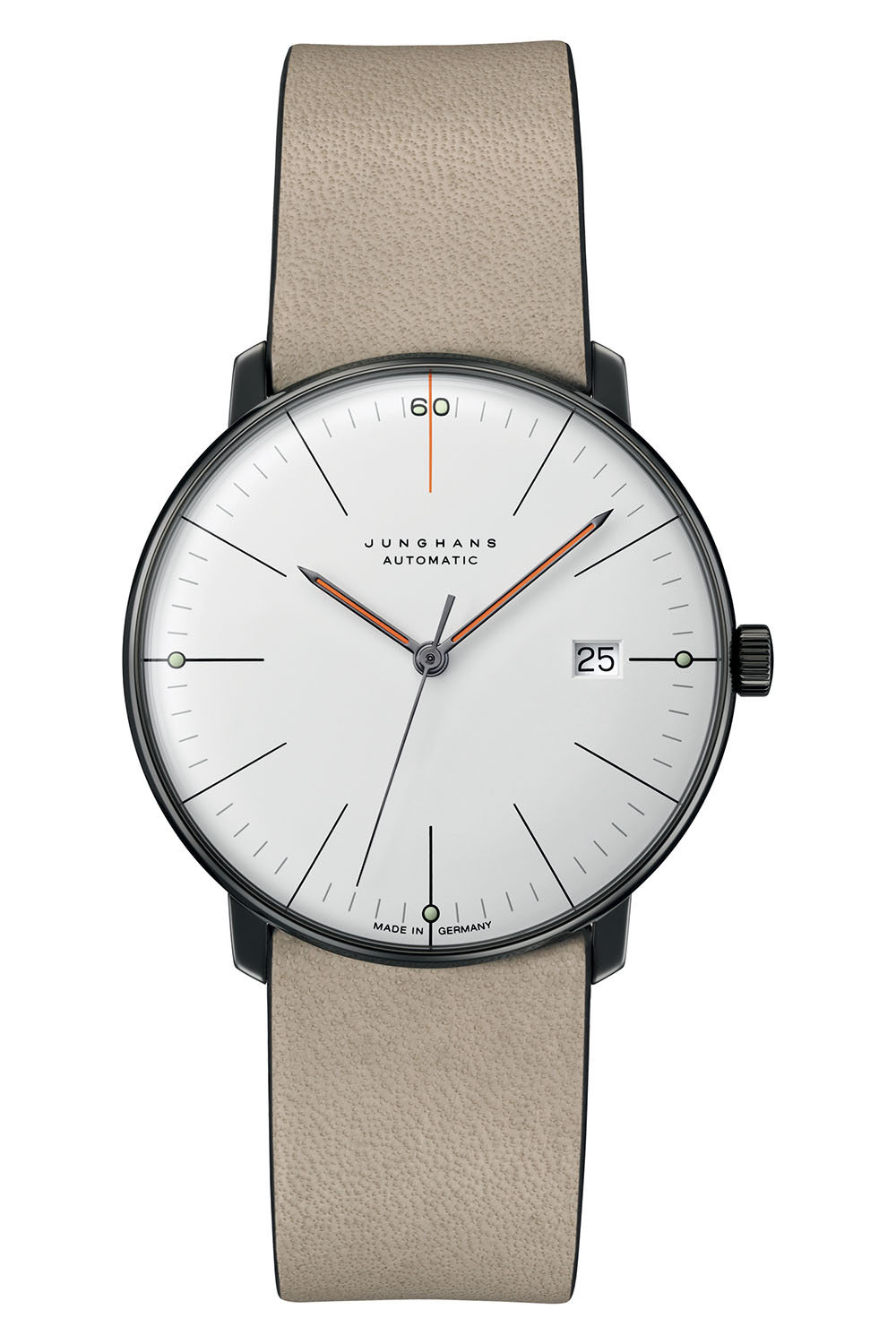
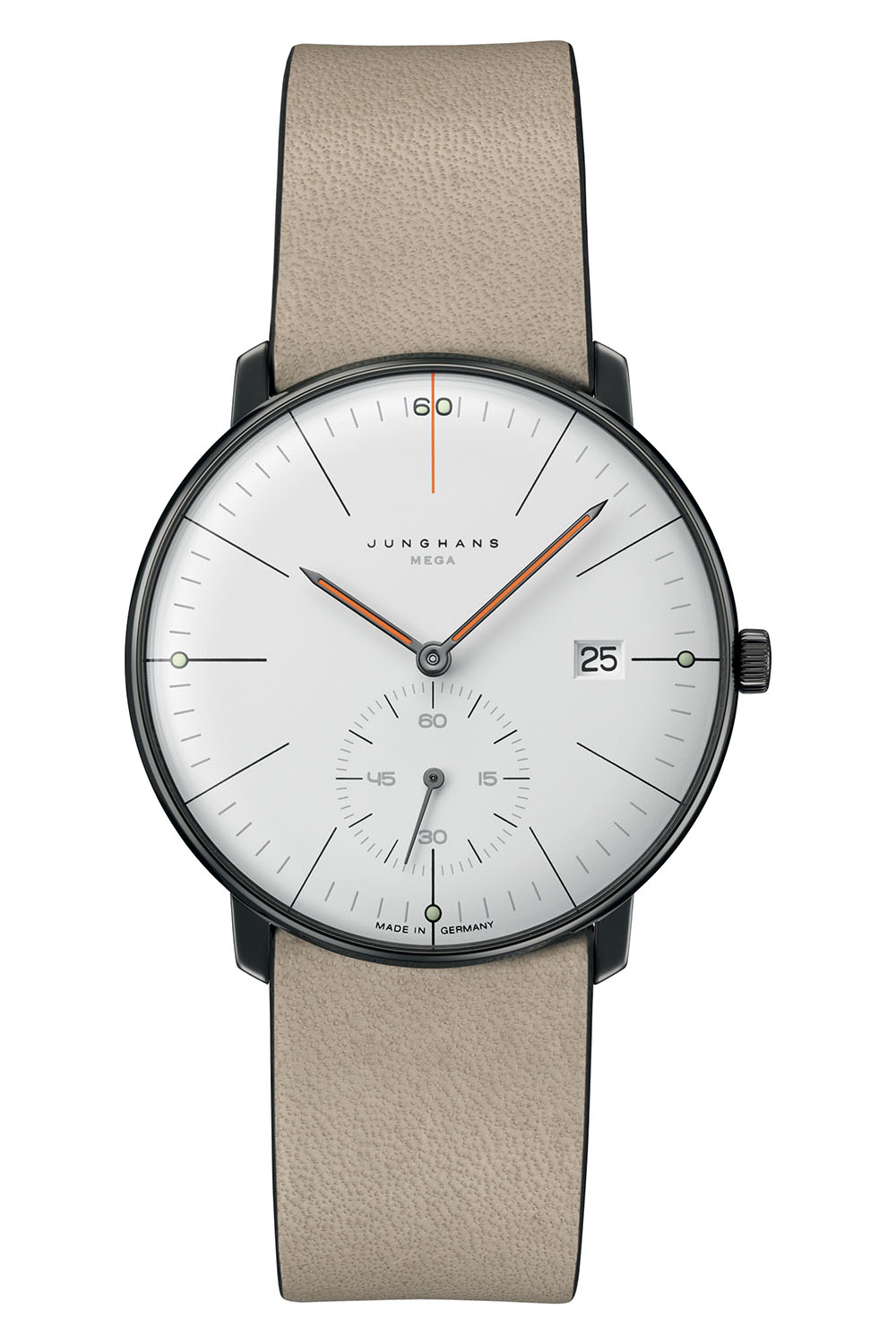
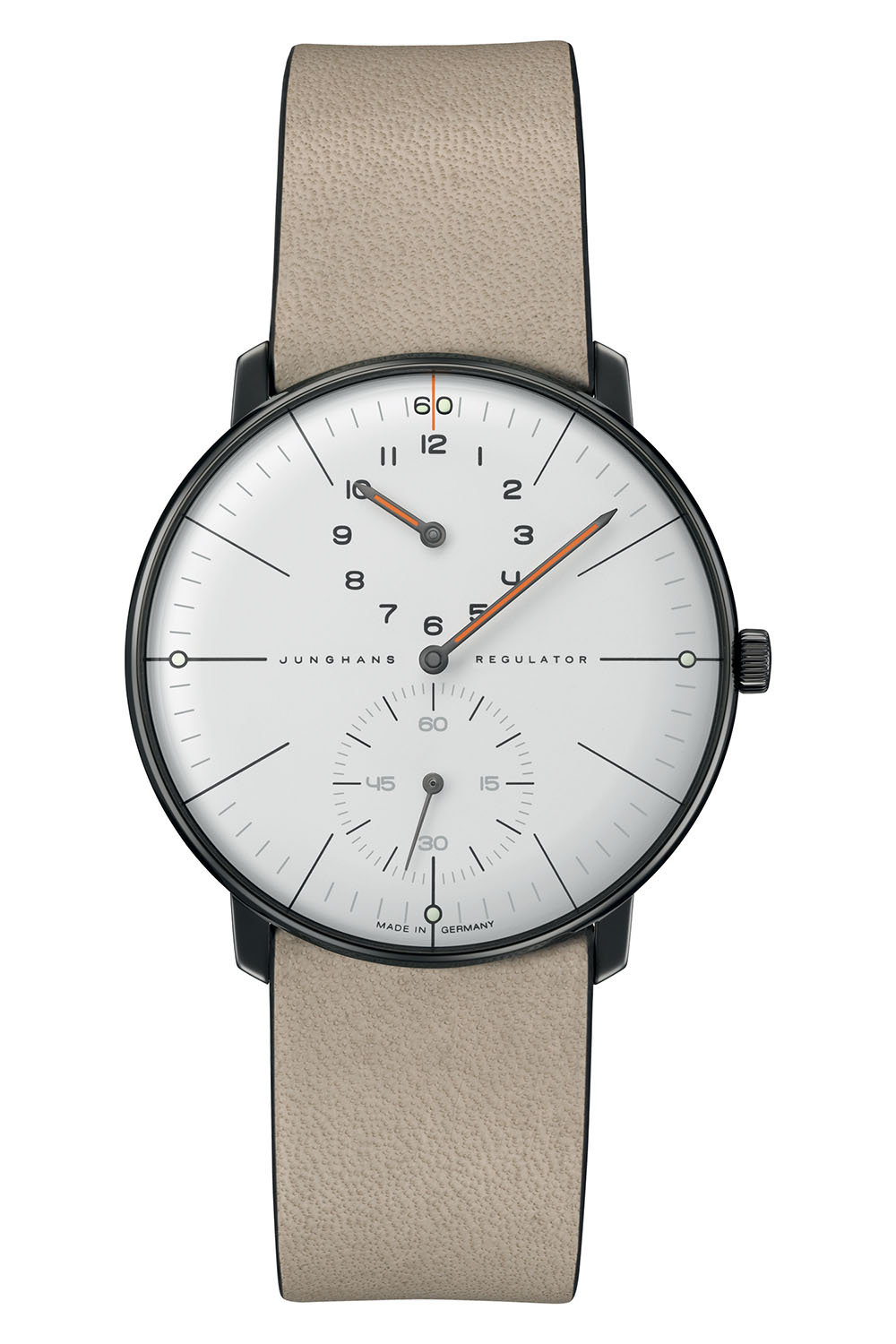




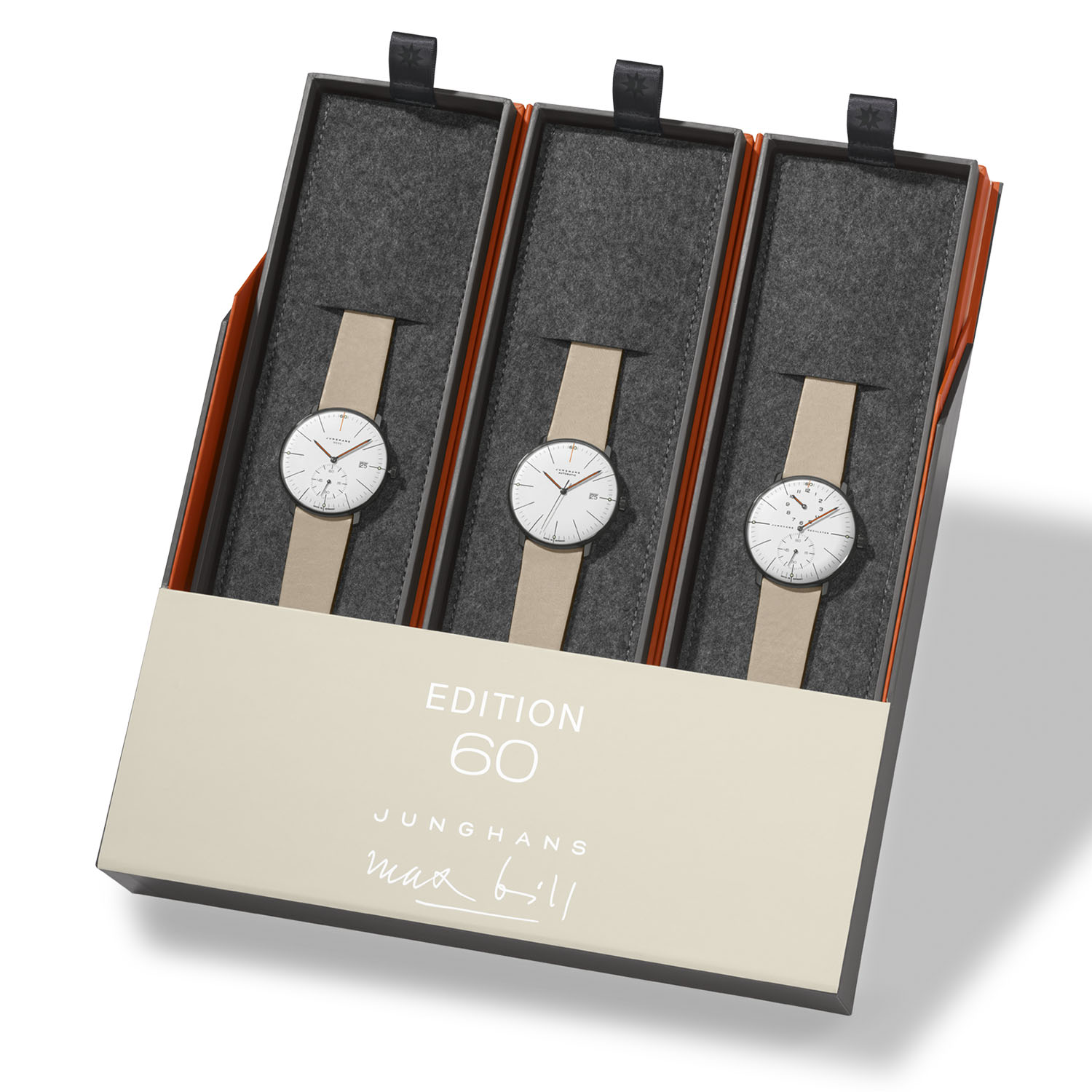



1 response
Why would anyone want to buy all three of these? They look too much the same.